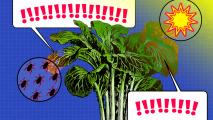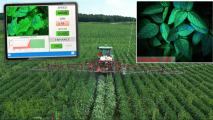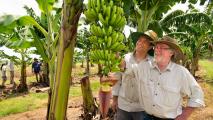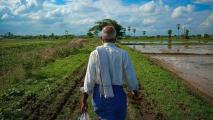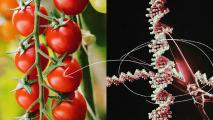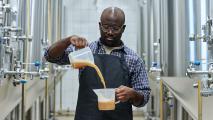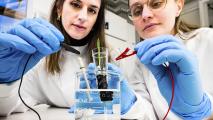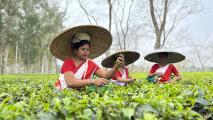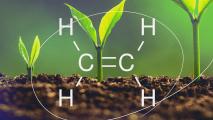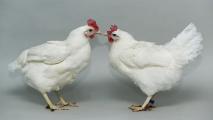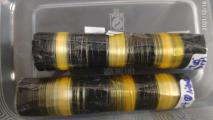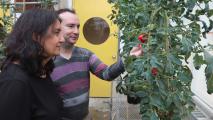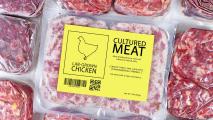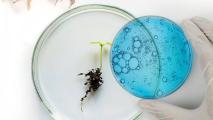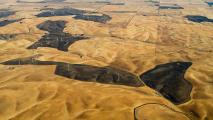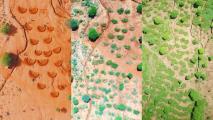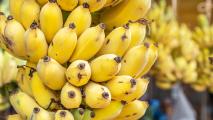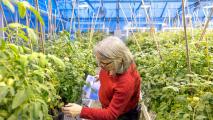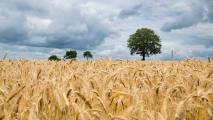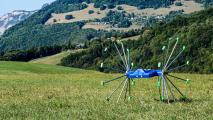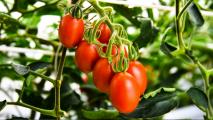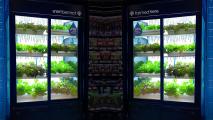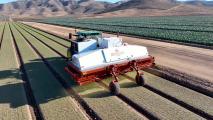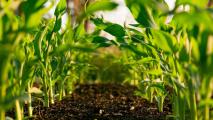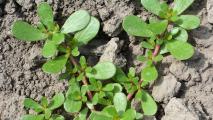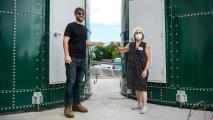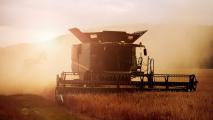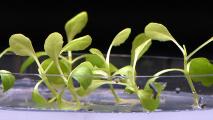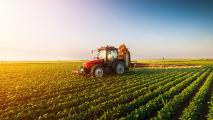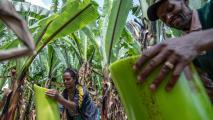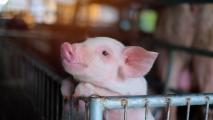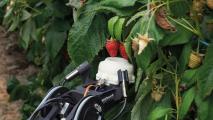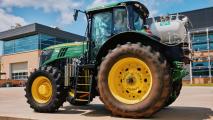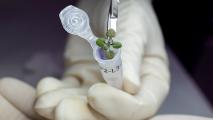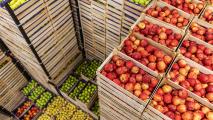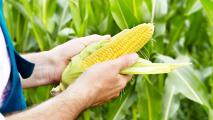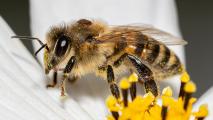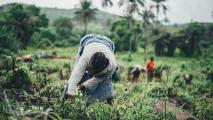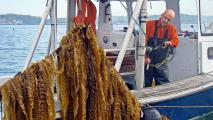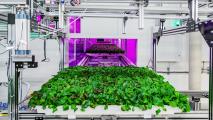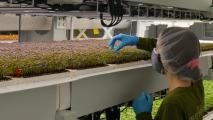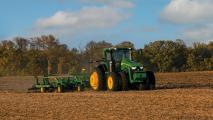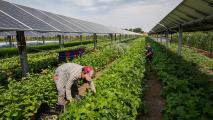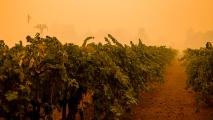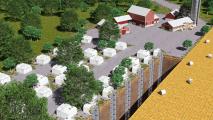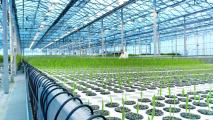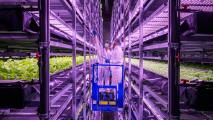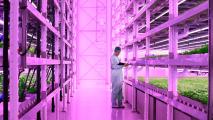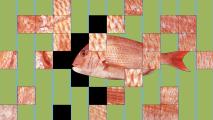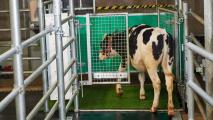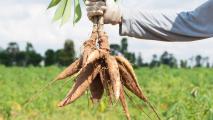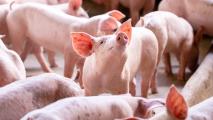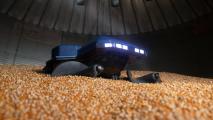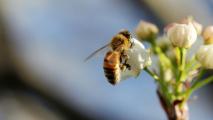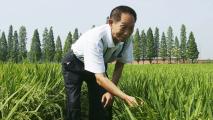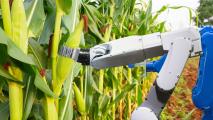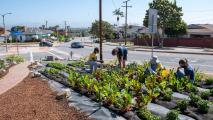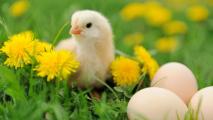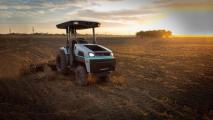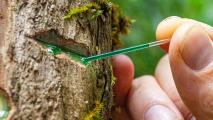Field: Agriculture
The West needs more water. This Nobel winner may have the answer.
Paul Migrom has an Emmy, a Nobel, and a successful company. There’s one more big problem on the to-do list.
How humanity transformed its fate
From surviving on wild plants and game to controlling our world with technology, humanity's journey of progress is a story of expanding human agency.
Boosted Breeding and beyond: 3 tech trends that could end world hunger
A world without hunger is possible, and the development and deployment of new farming technologies could be one key to manifesting it.
Plant sensors could act as an early warning system for farmers
Using sensors made from carbon nanotubes, researchers discovered signals that help plants respond to stresses like heat, light, or attack.
Scientists have invented a method to break down “forever chemicals” in our drinking water
Researchers have discovered a way to eliminate "forever chemicals," or PFAS, which usually take hundreds or thousands of years to break down.
The threat of avian flu — and what we can do to stop it
Avian flu is infecting cows on US dairy farms, and now a person has caught it — but new research could help us avoid a bird flu pandemic.
Reducing pesticide use while increasing effectiveness
AgZen has developed a system for farming that can monitor exactly how much of the sprayed chemicals adheres to plants, in real time.
World’s first GM banana approved in Australia
Australian regulators have approved a GM banana modified to resist Panama Disease, a devastating fungal infection.
How marine permaculture could revolutionize ocean farming
Marine permaculture could contribute to ecosystem restoration and pollution reduction, as well as empower local communities.
How potatoes can keep an eye on nuclear radiation
Plants scientists are researching how fields of genetically modified potato plants could detect radiation.
AI for agriculture: How Indian farmers are harvesting innovation
India's farmers combat climate change, pestilence, and financial burdens, with AI-driven initiatives offering transformative solutions.
CRISPR could eradicate horrific parasite that’s killing cattle
Uruguay is developing a CRISPR gene drive to eradicate the New World screwworm fly, a horrific agricultural pest.
New CRISPR tomatoes need less watering
Gene-edited tomatoes that can grow with less water could help solve the problem of feeding a world battling increased water scarcity.
Tastier nonalchoholic beer is here – will you drink it?
To some people, nonalcoholic beer sounds like an oxymoron, but newer techniques are producing tasty, high-quality options.
Zapping plants in “eSoil” makes them grow 50% larger
Using a new “eSoil” to electrically stimulate plants during hydroponic farming could potentially increase crop yields.
This startup wants to track soil carbon with AI and satellites
Boomitra’s remote sensing technology combines data from Earth and space to verify when carbon is coming out of the air.
Exposing plants to an unusual chemical early on may bolster their growth and help feed the world
"Priming" plants by exposing them to certain chemicals while they’re seeds can affect their growth later in life.
CRISPR protects 9 out of 10 chickens from bird flu
UK scientists have used CRISPR to create gene-edited chickens that are highly resistant to the avian flu virus.
Adding spider DNA to silkworms creates silk stronger than Kevlar
Spider silk is strong and tough, but hard to farm. Silkworm silk is easy to farm, but not that strong. What if we could combine the two?
Is this plant the protein food of the future?
Over the past 50 years or so, lupins have become more common as food for farm animals, and are also increasingly eaten by humans
Mutant tomato could save crops around the world
A mutant tomato breed, known to botanists for decades, is highly resilient against blossom-end rot, a notorious plant disease.
By 2040, 60% of “meat” won’t come from dead animals
"Novel vegan meat alternatives" and cultured meat will likely become competitors to traditional meat products, the report says.
Lab-grown cotton is on its way to consumers
Cellular agriculture startup Galy has signed a deal that will make its lab-grown cotton available to consumers for the first time.
California will begin backing intentional burns to control wildfire
After decades of suppression, California is now supporting prescribed burns and cultural burns.
Desertification is destroying fertile land. Here’s how we’re fighting it.
Desertification is destroying once-fertile land at an alarming rate, but desert greening techniques are making degraded soil bloom again.
Here’s how growing plants on the Moon could benefit Earth
Making plants grow on the Moon could be instrumental in helping gardens to grow greener on Earth in the face of climate change.
A banana that doesn’t go bad so fast approved by the Philippines
Billions of bananas are wasted every year, but that may change soon.
Detailed images from space offer clearer picture of drought effects on plants
Researchers are using remote sensing observations to build high-resolution systems to monitor drought from space.
Pest-resistant tomatoes finally available after 30-year wait
New lines of naturally pest-resistant tomatoes could help end farmers’ reliance on pesticides to protect their crops.
How to pull carbon dioxide out of seawater
Researchers have found an effective new method for removing carbon dioxide from salt water in the ocean.
ESA thinks we can grow hydroponic gardens on the moon
ESA is researching how to pull valuable nutrients from lunar regolith so that future astronauts can use them in hydroponic gardens.
AI for better crops
AI technology could transform how growers protect their harvests, by detecting plant diseases very early on.
Scientists use CRISPR to add an alligator gene into catfish
By using CRISPR to insert an alligator gene into catfish, Alabama scientists radically increased their disease resistance.
New AI-powered farming robot covers 50 acres of crops per day
French startup Meropy has developed an agricultural robot that can autonomously inspect crops from above and below.
The first ever honey bee vaccine has arrived
The USDA has conditionally approved a honey bee vaccine to protect the important insects from American foulbrood, a brutal bacterial infection.
7 ways CRISPR is shaping the future of food
Using the powerful gene-editing tool CRISPR, researchers are altering crops and animals to add desirable traits and remove undesirable ones.
Supermarket uses hydroponic farm to grow veggies onsite
By installing a hydroponic farm inside a grocery store, an Egyptian company is combating climate change while delivering a fresher product.
Farming robot kills 200,000 weeds per hour with lasers
Carbon Robotics’ LaserWeeder is a smart farming robot that identifies weeds and then kills them using high-power lasers.
Breakthrough in photosynthesis boosts plant growth up to 30%
In a small study, researchers have engineered soy plants to have higher yields thanks to improved photosynthesis.
The challenges of wireless farming technologies – like transmitting data through mud
The Agricultural Internet of Things involves technologies such as wireless underground communications and antennas in soil.
Weed’s “superpower” could help feed the planet
A Yale study focused on how photosynthesis works in the common weed purslane puts us closer to engineering crops resistant to climate change.
What your weed label really means
Through the largest analysis of commercial cannabis flower yet, Colorado researchers have found that the current labeling system falls short.
Massive vertical mushroom farm opens in New York
Alt-meat startup MyForest Food has opened a new vertical mushroom farm in New York.
Feeding insects to cattle could make meat and milk production more sustainable
Most U.S. adults aren’t ready to put insects on their plates but are much more willing to consume meat from livestock that are fed bugs.
3 ways autonomous farming is driving a new era of agriculture
Could autonomous tractors, drones, and seed-planters fill the growing labor shortage in the agricultural industry?
Artificial photosynthesis lets us grow plants in total darkness
A new artificial photosynthesis technique could boost crop yields on existing farms or allow us to grow plants in new locations — like space.
How artificial intelligence is boosting crop yield to feed the world
The Gene Ranking Artificial Intelligence Network (GRAIN) identifies genes that act at a fundamental level in crop metabolism.
Dive into the world’s first underwater garden
An underwater garden off the coast of Italy is introducing the world to a new type of sustainable agriculture.
Gene-edited wheat less likely to produce “probable carcinogen” acrylamide
A new gene-edited wheat contains 90% less of a compound that can turn into acrylamide — a likely carcinogen — when the crop is cooked.
After millennia of agricultural expansion, the world has passed “peak agricultural land”
This marks a historic moment in humanity’s relationship to the planet.
This starchy wondercrop could help alleviate food insecurity
Enset, a perennial banana-like fruit cultivated in southwestern Ethiopia, is an underexploited starch crop with significant potential.
Where does the plastic in our oceans come from?
Which countries and rivers emit the most plastic to the ocean? What does this mean for solutions to tackle plastic pollution?
Chinese robot clones pigs with no human help
A robot that automates a common technique for animal cloning has been used to produce a litter of pigs in China.
New harvesting robots are gentle enough to pick this fruit
A pair of harvesting robots are picking raspberries in Portugal, demonstrating the ability of tech to help combat seasonal labor shortages.
MIT grads demonstrate first ammonia-powered tractor
Amogy, a startup founded by four MIT grads, has transformed a John Deere into the world’s first zero-emission, ammonia-powered tractor.
Scientists grow plants in real lunar soil for the first time
Lunar soil was used to grow plants for the first time, suggesting that we may be able to produce food for astronauts off-world.
An ancient enzyme could supercharge photosynthesis
Researchers have resurrected an ancient version of the enzyme Rubisco in the hope of supercharging photosynthesis in today’s plants.
Smart sensor tells you exactly when fruit will ripen — or spoil
Inside vast warehouses, millions of fruits sit and slowly ripen. To help packers know when fruit has got to go, a biotech startup is turning to small sensors.
Silencing one gene with CRISPR boosts crop yields by 10%
Using CRISPR to knock out a single gene in corn and rice increased crop yields by up to 10% in field trials.
One breed of honey bee can survive its deadliest threat
A line of honey bees bred to resist the Varroa mite parasite has proven itself in a large-scale trial involving more than 350 bee colonies.
The West Coast wants to tap into the maple sugar market
Over 75% of the world’s maple syrup production is in Quebec. But with climate change threatening their seasons, West Coast producers are looking to tap in.
Combining crops and solar panels is allowing Kenya to “harvest the sun twice”
The panels are mounted high enough for crops to be grown underneath, sheltering them from the sun and allowing rainwater harvesting.
Californian wineries turn to owls as answer for growing pest problem
Rather than turning to rodenticides to deter pests, a new study is testing the effectiveness of owls to manage the problem.
CRISPR cattle cleared for the first time by FDA
Beef cattle genetically altered to be less susceptible to heat stress have been cleared for human consumption by the FDA.
3D ocean farming: creating food while cleaning the ocean
3D ocean farming can help us feed Earth’s growing population while also improving the health of the oceans.
First solar canal project is a win for water, energy, air and climate in California
California’s aging power infrastructure has contributed to catastrophic wildfires and multiday outages. Solar canals can help.
Innovative vertical farming companies to watch
Here are five vertical farming companies to keep an eye on — and a bonus nine that are selling food you can buy right now.
The world’s largest vertical farm is opening in Pennsylvania
Upward Farms plans to build what will be the world’s largest vertical farm in Pennsylvania — and fish are going to fertilize its crops.
John Deere unveils its first fully autonomous tractor
John Deere has just debuted an autonomous tractor it plans to sell in 2022 — bringing the self-driving tech into the mainstream.
Gene editing could spare countless animals by creating single-sex litters
Scientists have created single-sex litters of mice using gene editing. This work could spare countless animals from needless death, improving animal wellbeing in both scientific research and agriculture.
Self-driving electric tractor startup to boost production eight-fold
California startup Monarch Tractor has raised $61 million to increase production of its self-driving electric tractor.
Can CRISPR keep the beer flowing?
Researchers are turning to CRISPR to create barley better able to remain dormant in climate change — while being still ready to make beer.
Agrivoltaics let farmland serve double duty
Agrivoltaics combines farming with renewable energy, using the shade of solar panels to help plants thrive in a changing climate.
This machine can turn agricultural waste into fuel
Dumping and burning agricultural waste causes pollution and contributes to climate change. An India-based startup called Takachar promises to turn the problem into profits.
Series|
Challengers
Aquaponic shipping containers: The future of food?
Imagine growing fish and vegetables in a shipping container in your closest parking spot.
Using AI to help save wine from wildfires
California startup Tastry is using its wine “tasting” AI to help save wines impacted by wildfire smoke.
New startup takes vertical farming underground — literally
GreenForges is building an underground farm it thinks will deliver the benefits of vertical farming without two of its major shortcomings.
Genetically modified barley can grow meat protein
An Icelandic firm is growing genetically modified barley plants with special “growth factors” that could create lab-grown meat.
Inside Europe’s largest vertical farm
At a massive vertical farm in Denmark, food tech startup Nordic Harvest is demonstrating the benefits of moving agriculture indoors.
Series|
Make It Count
How vertical farming can save the planet and feed the world
In partnership with Million Stories
Vertical farming is a radical new way to feed our growing population sustainably. But can it replace traditional farming?
Scientists convert CO2 into synthetic starch
A process for making synthetic starch from CO2 eliminates the need for growing resource-intensive starchy plants.
Gene-edited fish grow up to 60% more muscle
A gene-edited fish that grows up to 60% more muscle on the same amount of feed could help revitalize Japan’s aquaculture industry.
Scientists toilet-train cows to reduce air pollution
To combat the negative environmental impact of cow urine, researchers have proven it's possible to potty-train calves.
These farmers want to salt the earth — and grow crops in it
As salt encroaches on productive agricultural land, a handful of startups are finding ways to make crops grow in seawater with genetic modification and transforming solar saltwork.
"Space farmer" grows plants under fake cosmic radiation
Researchers created a mini radioactive sky on Earth to study how cosmic radiation might impact how astronauts on Mars grow food.
Kenya’s GM cassava plant gets greenlight
Kenya is moving forward with developing a cassava plant that’s been genetically modified to resist cassava brown streak disease.
World’s first lab-grown chocolate made in Switzerland
Swiss researchers have developed a way to make lab-grown chocolate, using a single cocoa bean to create unlimited chocolate.
Cholera vaccine made from GM rice passes first human trial
An oral cholera vaccine that’s grown in genetically modified rice and can be stored at room temperature has passed its first human trial.
Disease-resistant pigs may be heading to farms soon
Using gene editing, researchers created disease-resistant pigs that could save the pork industry billions of dollars every year.
New CRISPR tech could help us create superior crops of the future
A new CRISPR technology that focuses on gene activation rather than deactivation could help us create the superior crops of the future.
A robot could save farmers from being buried alive in grain
The Grain Weevil robot helps farmers manage stored grain, keeping them out of bins where they might lose their lives to grain entrapment.
Disease-resistant banana created with CRISPR
African scientists have used CRISPR to create a disease-resistant banana that is indistinguishable from unmodified plants.
Antidote saved 100% of bees from lethal pesticide
Beehives are under threat from common insecticides. But researchers created pollen-like microparticles to deliver an antidote.
Yuan Longping: His rice helped feed the world
Scientist Yuan Longping's hybrid rice helped feed the world. His wild rice discoveries and hybrid rice inventions in the 1960s and 1970s helped alleviate food scarcity across Asia and Africa.
"Hands-free" smart farm will replace laborers with robots
At a smart farm in Australia, robots and AI will do all the manual labor, potentially foreshadowing agriculture’s "hands-free" future.
Microfarm startup brings fresh produce to food desert
California startup Crop Swap LA has planted a “microfarm” in an LA resident’s front yard and is now distributing the crops throughout the local community.
CRISPR could save billions of baby chicks before they hatch
Male chicks are killed as soon as they hatch, in a gruesome process called chick culling. Gene editing could save them.
Series|
Hard Reset
Vertical farms could take over the world
Vertical farming saves water, land, and energy — and it could be how we grow food on Mars.
The world’s first fully electric, self-driving tractor
Monarch Tractor’s all-electric, self-driving tractor could save farmers money, while also benefiting the environment.
“Phytomining” trees can extract metal from the Earth
Phytomining, a technique that uses trees to soak the metals out of contaminated soil, could offer new ways to mine for metals that are more sustainable than the existing, environmentally destructive methods.



